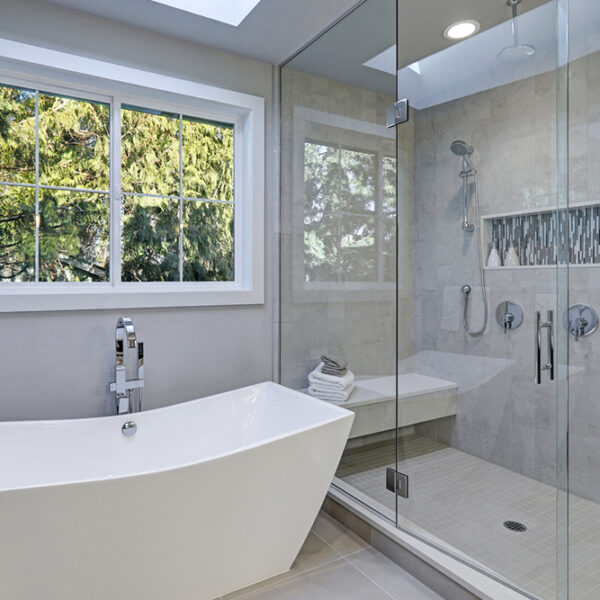Tub-to-Shower Conversion Price – Things to Know
Tub-to-shower conversions work for those who do not use their bathtubs as much as they initially believed they would. Such changes also open up the space, giving people more room. So, smaller bathrooms, in particular, can benefit from this remodel. But before opting for the conversion , it is important to know what the project involves . That said, the exact steps, duration, and cost of such a project vary based on the requirements.

Process
A tub-to-shower conversion begins with the removal of the existing bathtub. This can be done for various reasons, such as infrequent usage, changes in aesthetic requirements, lack of space, or low accessibility. Once the bathtub is removed, a shower will be installed in its place . The project involves a lot of work, typically requiring expertise. So, one might benefit from hiring a contractor or a tub-to-shower conversion company nearby. Professionals can also offer additional services like complete bathroom remodeling and replacement of other fixtures. The tub-to-shower conversion company quotes a price based on the type of services and the extent of changes involved.
Average price
The average tub-to-shower conversion price is about $3,000. Typically, the project costs anywhere between $2,000 and $12,000. That said, the final price can vary depending on the size of the shower space, the extent of changes, and the type of accessories and materials used. The cost can be as little as $1,200 and even as high as $15,000. Additionally, it is important to note that a luxurious and tiled walk-in shower will cost a lot more than a small and simple prefabricated shower stall installation.
Factors that affect the cost
1. Size of the shower
Before looking for shower conversion quotes from contractors nearby, one should know the dimensions of the space. If one needs a large shower space, they should be prepared to pay more than the average cost, as this project would require more labor and materials. Additionally , prefabricated shower installation kits that come in standard sizes are less expensive. On the other hand, a customized shower in a non-standard size will cost more than a larger standardized shower, even if the former is smaller.
Typically, a standard shower of the smallest size measures about 32 inches by 32 inches. The material cost here usually ranges between $800 and $1,200. But most homes have shower stalls measuring around 36 inches by 42 inches, the cost of which is approximately $900 to $1,400. Larger showers that require the space of an entire alcove could measure 36 by 60 inches to 60 by 72 inches. To install such large showers, one may have to pay anywhere between $1,200 and $7,000.
2. Materials
Since the materials used for prefabricated showers and customized ones differ, the final cost varies, too. Prefabricated shower kits typically made from materials like cultured marble, acrylic, and fiberglass are usually the most affordable. Acrylic is the cheapest among them, so a prefab acrylic shower may cost around $800 to $1,200. Similarly, cultured marble made with resin and stone particles can be cost-effective, typically priced between $800 and $3,000. Finally, fiberglass is the most durable option here, so it costs higher than other materials (between $2,000 and $5,000.)
On the other hand, customized shower materials are priced by the square foot. The prices start from around $1 per square foot and can go as high as $400 per square foot.
- Ceramic tile costs $1.25–$100 per square foot
- Porcelain tile costs $3–$30 per square foot
- Stone tile costs $5–$100 per square foot
- Porcelain slab costs $8–$30 per square foot
- Glass tile sells for $20–$50 per square foot
- Stone slab costs $40–$400 per square foot
- Solid surface (made with acrylic and/or polyester resin) costs $100–$200 per square foot
3. Shower layout
The layout also affects the overall price of the tub-to-shower conversion project.
- Square corner shower stalls
They are typically the smallest showers , so they carry the lowest price tag. The cost ranges between $350 and $1,400 for a prefabricated square corner shower. - Neo-angle shower stall
With three-angled panels, these showers can fit into corners as well. Their price starts from about $450 and can go up to $1,200. - Corner shower stalls
These showers come with curved or rounded walls and typically cost between $500 and $1,300. - Rectangular shower stalls
To replace a standard tub with this type of stall, one will have to pay anywhere from $500 to $2,300. - Walk-in shower
Also known as curbless showers, these units have a low or no barrier. They are usually the most expensive among standard shower stalls, priced between $2,100 and $4,000. - Custom tiled shower
This type of shower stall can be quite expensive, with prices starting from $25 per square foot for just the tiling process.
4. Cost of labor
Labor cost makes up a large portion of the total tub-to-shower conversion price. Usually, labor can cost about $700 to $1,600 for a prefab shower stall installation. A small standard-sized shower installation without any customization or a one-day tub-to-shower conversion service can be even cheaper. But if there is a lot of demolition, waste disposal, repairs, and plumbing work involved, the cost of labor increases, as the project can take anywhere from several days up to a week to finish. In most cases, a bathroom renovation contractor will charge between $50 and $75 per hour. If a licensed plumber is involved, they will charge $75 to $150 per hour based on the level of expertise and experience.





